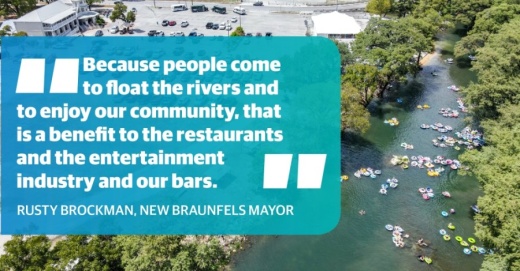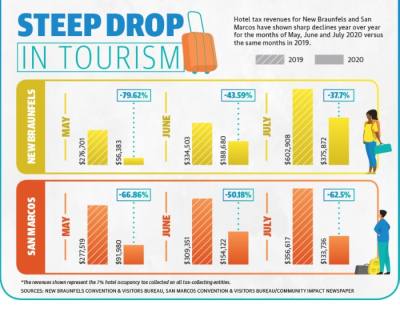The San Marcos area has felt a similar impact. The forced closure of city parks lining and adjacent to the popular San Marcos River due to the pandemic has hit the businesses and nonprofits that are largely dependent on the local tourism and recreation economy.•On June 26, Abbott issued rules stating that people in Texas “shall not use commercial rafting or tubing services, including rental or rafts or tubes and transportation of people for the purpose of rafting or tubing.”
Shane Wolf, general manager of Rockin’ R River Rides, which has several locations in the New Braunfels area, said ever since the order went into effect, there has been a sizable effort underway to not only educate people about the new rules, but to try to reclaim some of the lost revenue.
For river outfitters such as Rockin’ R and dozens of others, tube rentals and shuttle rides for customers from and back to their cars is a large part of their model, and Rockin’ R is one of the most prolific outfitters in the area.
“One of the questions that came up to the governor was why he shut down the river outfitters,” Wolf said. “And he was told that it might have been possibly due to an increase in [COVID-19] cases due to the shuttles. But time will tell, and they did not know that for sure, which is even more frustrating.”
For Wolf and several other outfitters that own land serving as an access point to the rivers in Comal County, the business plan is now to charge an access fee, which at Rockin’ R is $20 per person.
Because shuttle service is no longer allowed, customers are on the hook to find their own rides back.
Though some revenue is coming in for Rockin’ R through the access model, Wolf estimates it is about 10% of what the business would normally make. Right now, he said, Rockin’ R has 15 employees on its payroll. Normally it operates with 150.
Wolf said that Rockin’ R, which has been in business for more than four decades, is likely in a better situation than many other outfitters, mainly because its assets, including the land the businesses are on, are paid for.
New Braunfels Mayor Rusty Brockman said the 30 or so river outfitters throughout the area have seen hard times—notably some relentless droughts and low water levels in the Guadalupe and Comal rivers— and have persevered, but this situation is something altogether different.
Brockman pointed out that the river outfitters are one aspect of the local economy that relies on the rivers and their tourism draw.
“Because people come to float the rivers and to enjoy our community, that is a benefit to the restaurants and the entertainment industry and our bars,” Brockman said.
Judy Young, vice president of the New Braunfels Convention & Visitors Bureau, said community leaders and city officials have been working together to try to diminish some of the financial losses associated with the pandemic-related restrictions.
Young said the fact that Schlitterbahn, one of the biggest water parks in the country, is in New Braunfels certainly helps, but the hit to the local economy since April has been noticeable.
“Including hotels, motels and nontraditional properties, we have a capacity of over 4,000 rooms,” Young said. “We’ve had varying levels of losses in all of those segments.”
Data from the city’s hotel tax revenue shows sharp declines in May, June and July 2020 compared to the same months in 2018 and 2019.
In May 2019, for example, hotel tax revenue in New Braunfels was up 3.2% from May 2018. But in May 2020, those revenues dropped 79.62% from May 2019.
“Having limited access [to the rivers], certainly, we believe will impact summer numbers,” Young said. “We won’t know until the end of August. Every day is a new day, and we’re trying to be as nimble as we can be."
San Marcos economy also hit
The city of San Marcos has also taken a hit due to the governor’s executive order. Hays County Judge Ruben Becerra said it is critical to continue to follow Centers For Disease Control and Prevention and National Institutes of Health guidelines, and he has been doing so since March.
“It’s necessary, yet heartbreaking, to have businesses shut down,” Becerra said.
He added that one of his most repeated messages to constituents is to be responsible—wear masks and practice effective social distancing—so the restrictions that are hurting the local economy will not have to be reinstituted.
Though San Marcos and the surrounding area do not have nearly as many river outfitters as New Braunfels and its surrounding area, there are metrics to show how the community has been hit by the pandemic and subsequent restrictions.
As one indicator, the average occupancy rates for the city’s hotels dropped substantially in May, June and July of this year compared to 2018 and 2019, according to data from the San Marcos Convention & Visitors Bureau.
In July 2019, for example, the average hotel occupancy rate was 72.2%. This July, that number dropped to 38.8%.
“There are still people coming into town, and they’re still staying at our hotels, but not at the level that we’re used to,” said Rebecca Ybarra, director of destination services for the San Marcos CVB. “The order came through from the governor, and ... that was a huge turn for the hospitality and tourism industry.”
Ybarra said other than the local chapter of the Lions Club, which is inside city limits, there are three other river outfitters just outside the San Marcos city limits.
One of them, Texas State Tubes, has been operating as a parking lot like the Rockin’ R model and charging $10. Similar to Rockin’ R, patrons are also responsible for finding their own rides back to their vehicles.•Another group impacted by the closure of city parks in late June is the Lion’s Club.
Located at the Rec Hall at San Marcos City Park, the Lions Club accounts for a large portion of the tube rentals on the San Marcos River.
So far this summer, the Lions Club Tube Rental establishment has been open for 25 days.
“We normally have about 140 days that we’re open during the summer, so this is impacting us pretty dramatically,” said Mark Jalufka, general manager for the San Marcos Lions Club Tube Rental office.
The San Marcos Lions Club, which donates to or serves more than 100 charities and individuals in the local community, has seen steady growth in overall sales since 2015. Jalufka credits that to several factors, including price increases and merchandise and souvenir sales in the club’s tubing store.
Denisa Burnham, president of the San Marcos Lions Club, said that it is still too far from the end of the season, which typically ends in September, to estimate how much they lost this year in revenue, but the last two years the club has given more than $350,000 to local charities.
“In 2020, we are going to have about 15% to 16% of the sales that we had in 2019,” Jalufka said. “That’s how dramatic it is.”
Jalufka said he hopes maybe the Lions Club can reopen its tube rental operation in September, but he is not holding his breath.
He said at peak operational times during the summer, the Lions Club employs more than 60 people, but this year, after being open for 25 days so far, the organization has had to let all but one of its employees go. Jalufka said right now he is the sole employee.
Still, he remains optimistic.
In 2009, Jalufka said, when a fire burned down the Lions Club’s old tube rental facility resulting in a complete loss of the building and equipment, the city stepped up. Two weeks later, the rental shop opened up at a limited capacity; the local fire and police departments held fundraisers to help replace the lost equipment; and two summers later the club leased a new building from the city.
“What started out as a catastrophe ended up as a blessing in the long run,” he said.






